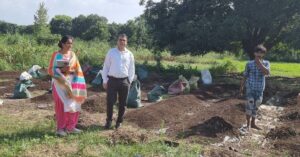Want to Grow Food on Your Terrace? This Startup Has Helped Over 400 Homes Do So!
Turning your terrace into a thriving farm doesn’t just help your family eat healthy food, it also helps save the planet. And this Jaipur man can help you do this, one step at a time! #LiveGreen #GrowOrganic

Archana Mishra, 65, was first inspired to grow her own food when her friend from Germany spoke to her about it. The former school teacher wanted to eat healthy but organic produce in the market was considerably expensive.
Want to try your hand at farming? Check out these gardening accessories and start your own vegetable patch at home now!
When she visited her daughter in the US, she was amazed by the concept of a farmer’s market where her daughter would frequently go to buy fresh produce.
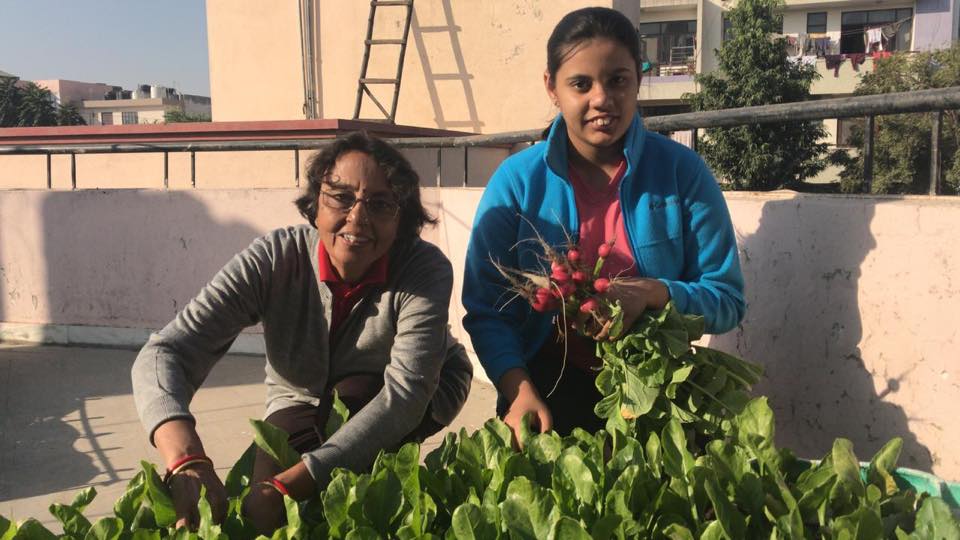
She came across Living Greens, a company which provides portable farming systems to customers living in urban spaces. In addition to working with individuals, they also work with corporates in developing green walls (vertical greenspaces) in office spaces.
It has been six years since, and now, Mishra grows her vegetables at her home terrace in Jaipur.
Speaking to The Better India, the delighted septuagenarian says, “My entire family is now involved in this process of growing food and it makes me so happy. Even my granddaughters join me while I am tending to my garden.”
In the backdrop of widespread land clearing for agriculture leading to at least 22 per cent of the overall greenhouse gas emissions, it has become imperative that we make efficient use of space. Living Greens was founded by Prateek Tiwari in 2013 with seed-funding from NRI investors living in the Silicon Valley.
Prateek is an Agricultural Engineer and an alumnus of the prestigious Indian Institute of Foreign Trade (IIFT), New Delhi. After serving in blue-chip companies like M&M, Reliance Fresh, ITC (Agri Business Division) and Walmart India, he decided to take the plunge to revolutionise urban farming. He resigned from Walmart in May 2011 but had to put in two arduous years of experimentation to create a do-it-yourself portable farming system.
How it began
Although the Living Greens was officially founded in 2013, it had its modest beginnings in July 2012.
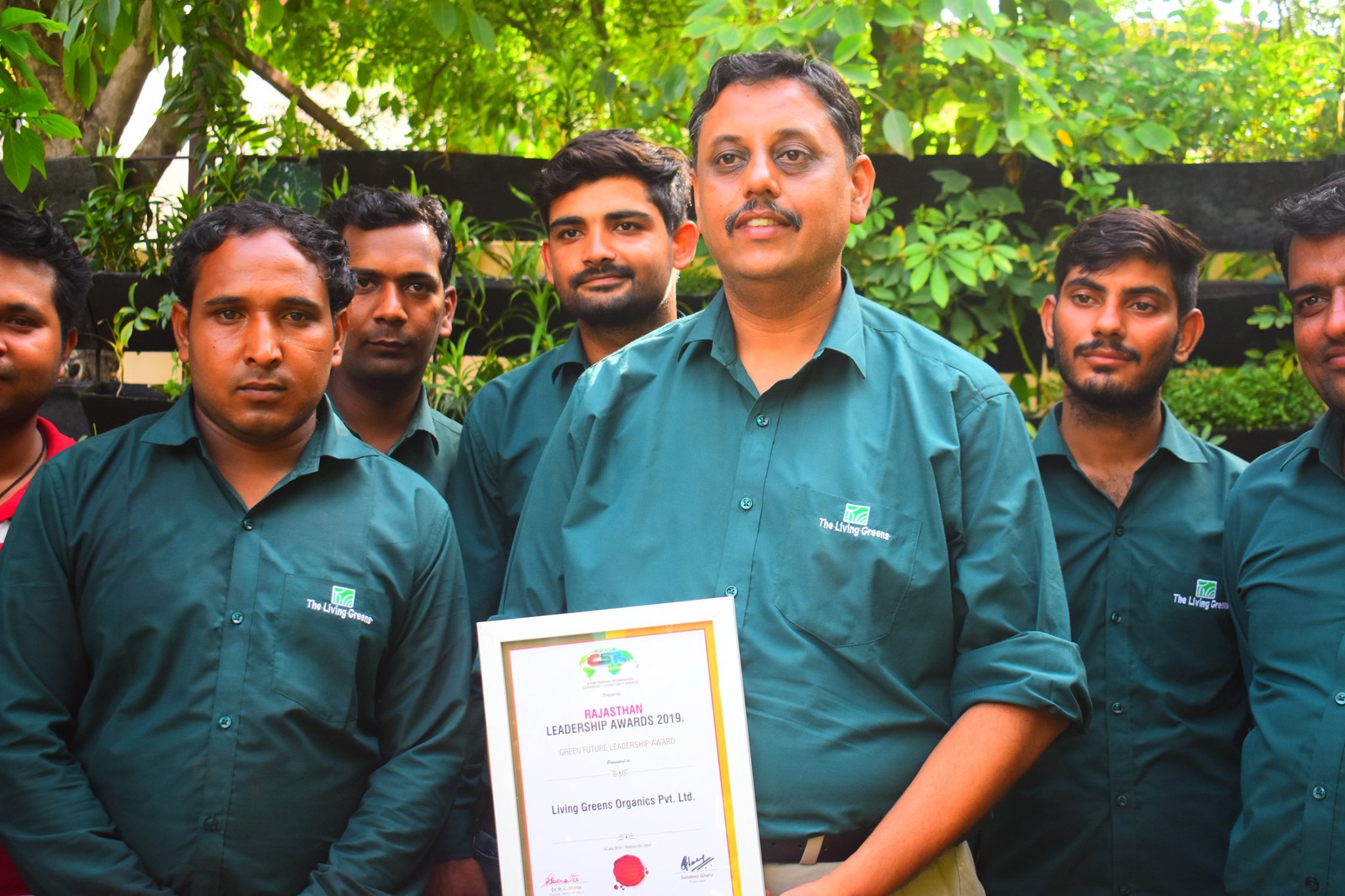
“We launched our concept not as a product but as a service i.e. anybody interested in experimenting with this idea could take our Portable Farming Systems on rent. This attracted many people to experiment. As most of them subsequently decided to purchase the equipment, we scrapped the rental scheme,” says Prateek.
He had a deep and strong conviction that cities must grow their own food. “There is a strong sense of fear that we are eating a bit of cancer everyday in our vegetables, which have been grown using lethal pesticides and effluent water containing carcinogenic heavy metals,” he says.
He discusses several benefits of developing a rooftop farming system. “Covering the rooftops with lush green organic farms not only cools the building but also generates tonnes of fresh oxygen in cities suffocating in their own pollution besides making use of under-utilised urban spaces,” says Prateek.
Along with a profound sense of responsibility to utilise his agricultural education and knowledge, he had a strong desire to convert under-utilised urban spaces like rooftops, plots, gardens, and farmhouses into food-growing urban spaces.
After the idea gained traction, the team of Living Greens focused on offering an A-Plus service experience to clients. “As they [customers] enjoyed growing their vegetables on their rooftops, we encouraged them to spread their ‘joy of farming’ among their friends and on social media. We thus expanded our client base through referrals from happy customers,” says the founder.
Since then, over 400 houses have become organic homes where people grow fresh vegetables on their rooftops. Mishra was one of their first ten customers and she still gets in touch with them when she needs help with anything related to her garden. For this, she pays a nominal fee.
How it works
The Living Greens has a range of products and services. Their main product is the Portable Farming Systems (PFS) which comes in a standard size of 10 feet X 4 feet. The number of PFS’ to be installed on a rooftop depends on the available rooftop space and the number of adults in the family. The prices go down per unit when purchased in bulk. The installation takes between 48 to 72 hours.
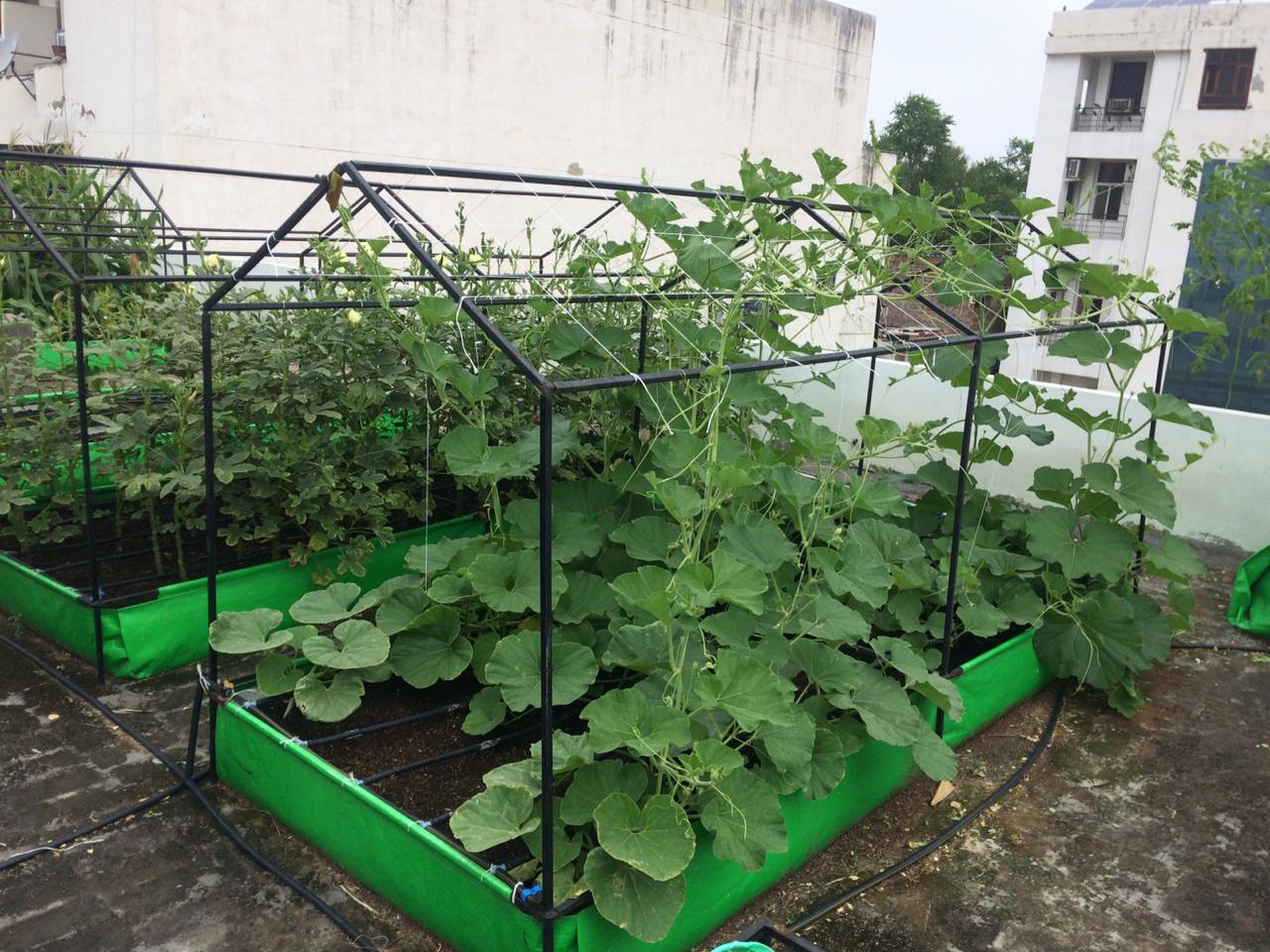
They also provide a set of organic sprays for pest, disease and nutrient management of plants being grown in the PFS. One organic inputs kit can be applied to two PFSs for four months.
There are also four kinds of root fertilisers that must be used regularly by the client.
Prateek points out that the pesticides for an organic garden also need to be free of chemicals.
He believes that a focus on a prophylactic approach instead of a symptomatic one is better for the overall health of plants. For this, they developed seven sprays for seven days which must be applied on the plants for four months. These bio-pesticides are made of organic materials like neem oil which reduces the egg-laying capacity of pests.
Another example is a liquid fungus called Beauveria bassiana which is used to control pests like whiteflies among other insects in agriculture.
Onsite support system is another service they offer. This comprises of weekly and monthly visits once the unit is installed. After the 4-month support period, customers can pay per visit for additional guidance.
They also provide the services of an online support system.
“Our team of agri experts can receive the problem-pics from the client, identify the pest/disease/nutrient issue and give precise recommendations from within the organic inputs kit, for solving the problem,” says Prateek. Thisfacility is free.
“After offering a basic training to the client at the time of installation, we continue to support them online, by sending all required information in the form of charts/diagrams/videos/video-chats,” he adds.
Expansion and challenges
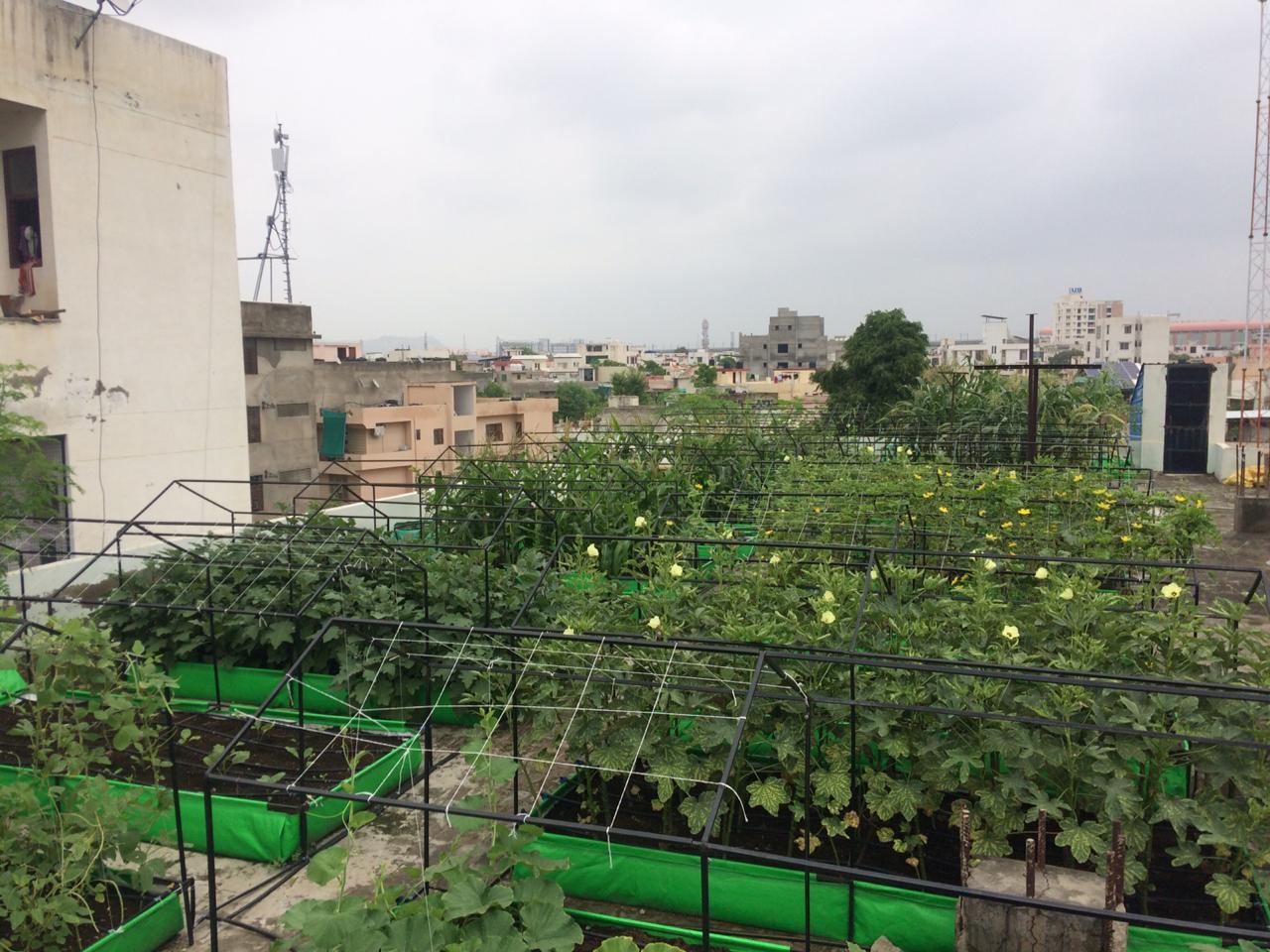
The road to success was not easy. When Living Greens first began, a lot of people did not know much about urban farming and believed that it was practiced by farmers on open lands in rural areas. There was also a dearth of quality and well-tested organic inputs, says Prateek.
He also started with a very small team who did not have much knowledge of organic farming. There was a need for a collaborative effort between the client and employees on site, with a constant exchange of expertise.
Now, the company tries to employ people who have some background in agriculture. Hardayal Shefma, 24, is one such employee who has a diploma in agriculture from the Krishi Vigyan Kendra.
“I have learnt so much about organic farming and its health benefits. I help in installation, provide support, and expertise for the maintenance of these gardens,” says the employee who has been working in the company for over three years now.
The Living Greens has also expanded its operations from Jaipur to New Delhi, Punjab, Uttar Pradesh, Maharashtra, Tamil Nadu, Madhya Pradesh and West Bengal. They transport their PFSs with one person from their installation team who then arranges for local labour for installation on site.
The Living Greens also has its franchisees in Lucknow, Bhopal, and Pune.
So, what is on the cards for the Living Greens now? “We want to become the largest urban organic farming company in the world, apart from creating greener and more breathable cities for future generations,” says Prateek as he signs off.
Also Read: 42-YO Breathes Life Into Ghost Villages With Natural Farming, Rural Tourism!
Picture Courtesy: The Living Greens
(Edited by Shruti Singhal)
Like this story? Or have something to share?
Write to us: [email protected]
Connect with us on Facebook and Twitter.
If you found our stories insightful, informative, or even just enjoyable, we invite you to consider making a voluntary payment to support the work we do at The Better India. Your contribution helps us continue producing quality content that educates, inspires, and drives positive change.
Choose one of the payment options below for your contribution-
By paying for the stories you value, you directly contribute to sustaining our efforts focused on making a difference in the world. Together, let's ensure that impactful stories continue to be told and shared, enriching lives and communities alike.
Thank you for your support. Here are some frequently asked questions you might find helpful to know why you are contributing?


This story made me
-
97
-
121
-
89
-
167




